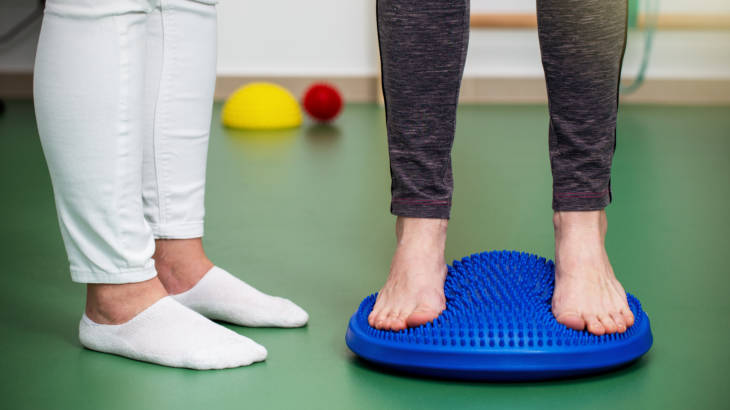
Rehabilitation
Rehabilitation is a planned and purposeful activity that helps the person rehabilitating to function as independently as possible in their everyday life and living environment. Rehabilitation is a personal process, which begins with the need for change and motivation.
Rehabilitation is based on the client’s resources and is a planned activity that strives towards goals that are important to the client.
The free services of the rehabilitation services are:
- rehabilitation services for people under the age of 18
- assessment and guidance visits
- group meetings
- war veteran rehabilitation
Persons over the age of 18 may be charged a fee for an appointment that they have not attended and if they have no acceptable reason regarding why they have not contacted Soite in time to cancel the appointment. This also applies to otherwise free services.
Availability of medical rehabilitation service
Individual medical rehabilitation services are afforded based on the need for them, on an assessment made by Soite’s experts, on common goals and on a rehabilitation plan. The availability criteria for therapeutic treatments shape the rehabilitation planning and decision-making.
Decisions regarding institutional rehabilitation periods are made by the chief rehabilitation physician. Outpatient therapy periods are decided in multiprofessional work groups:
- The rehabilitation working group for children and young people includes the chief rehabilitation physician, clinic physician, a physician and nurse at the outpatient clinic for children and adolescents, rehabilitation instructor, physiotherapist, ergotherapist and speech therapist, rehabilitation secretary and the director of the rehabilitation services.
- The rehabilitation work group for the working-age and elderly includes the chief rehabilitation physician, a generalist, the rehabilitation secretary and the director of the rehabilitation services.
The client has the right to refuse to discuss a particular matter in the work group, in which case the decision is made by the director of the rehabilitation manager based on the recommendation of the attending physician.
Rehabilitation guidance
In rehabilitation guidance, we offer the client comprehensive guidance, information, advice and activation, as well as support for the client and their family or close network when illness or disability affects the flow of everyday life. In rehabilitation guidance, we search together for services that suit your needs and life situation.
Soite’s rehabilitation instructors offer rehabilitation guidance and organize course activities. The rehabilitation instructor informs the client about the services and support measures available to support rehabilitation, functional capacity and participation according to the client’s individual rehabilitation needs, and acts as the client’s partner in their rehabilitation and its planning and coordination.
The rehabilitation counselor makes home, daycare, school and workplace visits and surveys the client’s overall situation in the client’s own environment. In addition, the rehabilitation counselor works in cooperation with the network related to the client’s rehabilitation.
Becoming a client of rehabilitation guidance
Rehabilitation guidance is a service aimed at groups with long-term illnesses or disabilities, children and adults, as well as their families and close social circle, mainly during the illness and adaptation phase.
Rehabilitation clients can come to guidance in relation to treatments or follow-ups, with or without a referral from a healthcare professional or other professional, and after they themselves or a family member contacts the rehabilitation guidance. The service is free of charge for the rehabilitation client.
Kela järjestää monipuolista kuntoutusta kaiken ikäisille ja turvaa toimeentuloa kuntoutuksen aikana. Kuntoutus auttaa elämään sairauden kanssa tai jatkamaan opiskelua tai työtä.
Kela organizes versatile rehabilitation for clients of all ages and ensures an income for clients during rehabilitation. Rehabilitation helps clients live with illness or continue studying or working.
- Rehabilitation and adaptation training courses
- Rehabilitative psychotherapy
- Intensive medical rehabilitation
- Neuropsychological rehabilitation